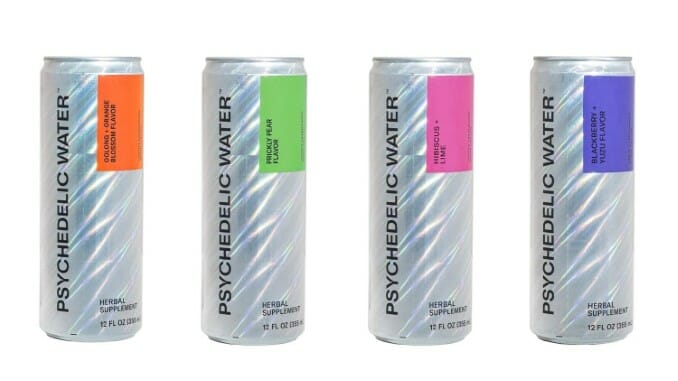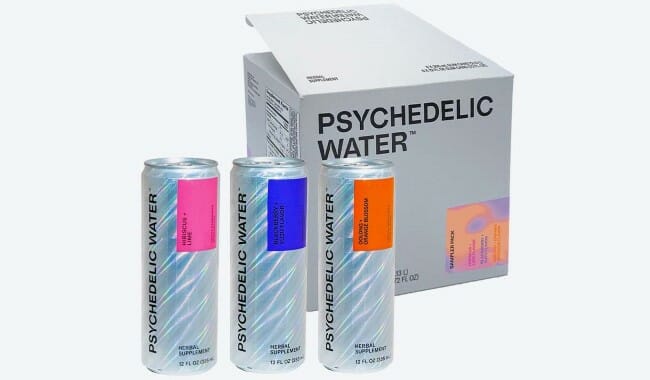Tasting: Exploring the Mood-Boosting Effects (and Downside) of Psychedelic Water
Photos via Psychedelic Water
When you unleash a product named “Psychedelic Water” on the world, consumers are naturally going to have questions. Questions like “Is this a joke?” Questions like “Does it actually have an effect?” And questions like “If it does have an effect, how is this even legal?”
Suffice to say, it takes a little digging to fully understand what is going on with Psychedelic Water, a product you may have seen making the viral rounds on TikTok recently. There, it’s been hailed by Gen Z (naturally) as a miracle mood booster, embraced by the “health-conscious” new generation that is increasingly toying around with various forms of “sober curious” living that involve eschewing the drugs favored by their forebears such as alcohol and cannabis. Instead, it’s all about fun and exciting new drugs, even when in reality those drugs are hundreds of years old.
Case in point: kava, or “kava kava” if you prefer. The bitter root has been consumed by Pacific islander cultures for hundreds of years, sought out for its calming and sedative effects. Occasionally demonized, and linked to various health dangers, kava has at times been viewed with distrust by consumers in the West, but in recent years has surged in popularity, with “kava bars” opening throughout the U.S. wherein one can consume draughts prepared with the root. As if it needs to be said, kava is legal in the U.S., and it also forms the key psychoactive ingredient of Psychedelic Water.
What we have here is essentially a flavored seltzer, infused with kava root extract, damiana leaf extract, green tea leaf extract, and various flavorings and sweeteners. The company markets it as “the first legal psychedelic, mood-boosting, hangover-free beverage,” with the obvious implication being that Psychedelic Water can replace the less “natural” potables of one’s diet, providing something akin to the buzz of alcohol or cannabis without the drawbacks. It notably does not contain psychedelic substances such as psilocybin, and does not induce the hallucinations or visual effects of mushrooms or LSD. Instead, this is simply meant to function as a mild pick-me-up, available in an array of flavors such as Hibiscus Lime, Blackberry Yuzu, Oolong + Orange Blossom, and Prickly Pear. The product exploded into popularity on platforms such as TikTok upon release, selling out its first production run immediately as it eyes expansion into nationwide retail. They’re currently projecting more than $5 million sales in their first year.
That’s all well and good, but I was curious how Psychedelic Water might actually be as an experience, so I went ahead and tasted some samples for myself. What I found actually backed up the brand’s claims, at least to some extent … but simultaneously, I encountered drawbacks that make me question whether I’d ever be interested in sampling Psychedelic Water again. Read on to hear more.
Psychedelic Water Review

The first thing one can’t look past in assessing these cans of Psychedelic Water is that they’re about the furthest thing from “seltzer” when it comes to enjoying them as an actual beverage. The current generation of consumers has been trained to expect both standard flavored seltzer (La Croix, etc) and hard seltzers (the spawn of White Claw) to have a low threshold of flavor and be quite dry in terms of the impression of sweetness, and Psychedelic Water is neither of those things.
This is presumably because ingredients such as kava root extract—the primary “psychedelic” ingredient here, which promises “warm, happy feelings”—are naturally quite pungent and strongly flavored. The kava and damiana leaf extract impart strong herbaceous notes into the drink, so those notes have to be countered by equally strong impressions of fruit and sweetness, which Psychedelic Water gets from both monk fruit concentrate and the sweetener erythritol. The effect is a surprisingly strongly flavored drink, which can be a little overwhelming to the palate. Drinking the Hibiscus + Lime can, you find the flavors duking it out for supremacy, with big, resinous flavors similar to rosemary or juniper intertwining with bright citrus and red berries. In short, it’s likely to be very much an acquired taste, and I question if many consumers would choose to drink this on its flavor merits alone, if it wasn’t promising psychoactive effects.
As for the “psychedelic” portion, though: After sampling this, I believe there actually is some merit to the brand’s claims. Within 15 to 30 minutes of drinking a full can of Psychedelic Water, I did indeed feel buoyed by a certain sense of wellbeing, and a pleasant tingling I can only really attribute to the drink. Was it much different than the effects of a small amount of cannabis? Not really, but in the moment I found myself impressed that there seemed to be an effect at all. I was fully prepared to report that Psychedelic Water didn’t seem to have any psychoactive effect, but I now genuinely believe that it does. Now, is that effect worth drinking something where you don’t particularly enjoy the flavor? That’s harder to say.
Likewise, there are other factors to take into consideration here, from the rather gaudy price point ($33 for a 6-pack), to the wall of warning text on the Psychedelic Water website, which says, among other things: “US FDA advises that a potential risk of rare, but severe, liver injury may be associated with kava-containing dietary supplements,” and “do not consume with alcohol,” or “limit 2 cans per day.”
Oh, and there was the after-effect of Psychedelic Water to consider. The product markets itself as being “hangover free,” and this proved accurate in my case, but what I instead experienced was waking up in bed hours later, my stomach knotted in some of the most intense cramps I’ve ever felt. Stumbling to the bathroom, I then experienced … some rather severe gastrointestinal distress, accompanied by wave after wave of nausea.
Now, could this nausea and stomach distress have something to do with another factor, such as the frozen pizza I consumed that evening? Sure, it’s certainly possible. But reading more about kava, users acknowledge that the most common side effects of the root for certain users is indeed stomach aches and intense feelings of nausea. Given that, it seems like an awfully big coincidence that I would find myself doubled over in pain only hours after ingesting a can of Psychedelic Water.
This is all to say the following: I now have no doubt that Psychedelic Water has an effect on the body. I experienced a pleasant sense of wellbeing under its effects, but I likewise experienced something deeply unpleasant a few hours later. I likely won’t ever be able to say for sure if the two were related, because I’m not exactly about to ingest more of the stuff and find out. If you’re still curious about Psychedelic Water, you’ll just have to try it (or kava) for yourself and find out if your experience is the same as mine.
Jim Vorel is a Paste staff writer and resident liquor geek. You can follow him on Twitter for more drink writing.






































